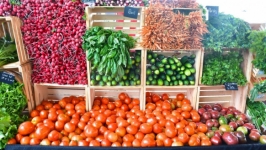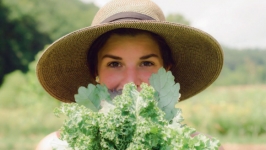The Homestead Manor's Farm to Fork Experience
Sitting in the Homestead Manor's bar on a cloudy summer day, with mist hung about the windows and the greenhouse just visible through the treeline, time seems to slow down. The air seems fresher, with flowers blooming around every corner. The sound of traffic is replaced by the soft hush of the pond fountain. No one seems to be in a rush. And why would they, with fresh flavors that make you wish you could slow time down to microseconds to enjoy the every single flavorful burst across each of your tastebuds––the product of that greenhouse just a jaunt across the lawn?
When Homestead Manor boasts a “farm to fork” experience, they aren’t exaggerating by any means. In fact, 10 of the property’s 50 acres are dedicated to the organic farm which provides much of the produce for the Harvest Homestead restaurant along with the other A. Marshal Family Foods properties (Pucketts Gro. & Restaurant, Pucketts Boathouse, Scouts Pub, and Deacon’s New South). Vegetables are carried straight from the field, into the kitchen on the historic plantation.
Built in 1819, Homestead Manor is rich with history and encourages an educational experience, welcoming guests to explore the mansion as well as the farm, just a short walk from the dining room. Visitors can walk through the property, explore the garden, see the chickens, sunflowers, tomatoes, okra growing tall, and more than 70 other varieties of flowers, fruits, vegetables, and herbs. It's worth the venture around the pond and over the train tracks, even in the mud. For those who did not grow up on a farm, seeing where the very ingredients of their meal were harvested, possibly mere hours before, is extraordinary.
The chefs at Homestead Manor work closely with farm manager, Ashleigh Newnes, shaping the menu around what is fresh, in season, and available. The result; bold, flavorful dishes and a menu constantly evolving with the seasons. While the whole menu adapts to what blossoms forth from the garden, the “Farm to Fork Vegetables” section in particular features “harvest vegetables.” This portion of the menu is reserved for the freshest bounty of the farm, whatever that maybe as Mother Nature has a mind of her own. This summer, tomatoes are coming late and the spring Kale is still putting out. A few unexpected crops have popped up as well, springing from the remnants of last year's plantings. Ashleigh and fellow Homestead farmer Tracey Burks (the two also jointly own and operate Botanical Harmony farm) also forege wild-growing ingredients on the property, such as mushrooms, which the chefs turn into marvelous edible creations. Harvest Homestead’s seasonal menus promote the chefs’ individualism and ability to turn a nostalgic dish into a modern rendition––creating rich, layered plates, brought to life by fresh organic produce.




















